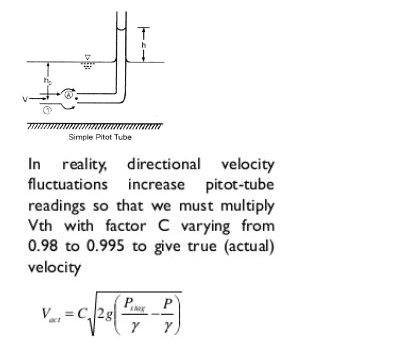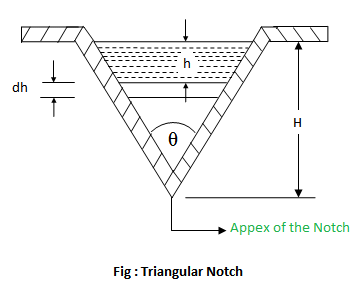Flow Measurement | Civil Engineering SSC JE (Technical) - Civil Engineering (CE) PDF Download
Chapter 6 Flow Measurement
| Device | Measurement |
| Venturimeter | rate of flow (discharge) |
| Flow nozzle | rate of flow |
| Orifice meter | rate of flow |
| Bend meter | rate of flow |
| Rotameter | rate of flow |
| Pitot tube | velocity |
| Hot wire anemometer | air & gas velocity |
| Current meter | velocity in open channels |
Venturimeter:
-Cone angle of convergence side (20°) is greater than cone angle of divergence side (5° to 7°).
-Position of venturimeter does not play any role in discharge thus it is constant for horizontal, inclined or vertical position.
-Qac = Cd Qth
-Cd = coefficient of discharge = 0.95 to 0.98
-h = venturi head which is difference between pressure heads
-Throat diameter is known as size of the venturimenter.

Orifice meter:
-It is a cheaper arrangement but has more energy loss.
-Cd for orifice meter = 0.68 - 0.74


-a1 = πd2/4
-a2 = πdc2/4
Pitot Tube:
-It is based on principle of conversion of kinetic head into pressure head. The point at which velocity reduces zero is called stagnation point.

-Vac = Cv .Vth
-Cv = Coefficient of velocity = 0.99
-ps/γ = stagnation head &  static head.
static head.
-Velocity head is indicated by the difference in liquid level between the Pitot tube and the piezometer.The Pitot tube measures the total head and therefore known as total head tube.
Hydraulic Coefficients:
- Contraction coefficient (Cc) =
- Coefficient of velocity of (Cv) =
- Coefficient of discharge (Cd) =
- Cd = Cv . Cc
Flow through orifice in the tank:
Discharge through orifice when head over orifice is h
Time required to lower the level from H to h

Rectangular Weir/Notch:



L = length of crest
H = head above crest
Triangular weir:


Flow over cippoletti weir or trapezoidal weir:
-Trapezoidal weir is also called as Cippoletti weir. This is trapezoidal in shape and is the modification of rectangular weir with slightly higher capacity for same crest strength.
-The sides are inclined outwards with a slope 1:4 (horizontal : vertical)


|
2 videos|122 docs|55 tests
|
FAQs on Flow Measurement - Civil Engineering SSC JE (Technical) - Civil Engineering (CE)
| 1. What is flow measurement in civil engineering? |  |
| 2. What are the different methods used for flow measurement in civil engineering? |  |
| 3. Why is flow measurement important in civil engineering? |  |
| 4. How is flow rate determined using a Venturi meter? |  |
| 5. What are the advantages of using ultrasonic flow meters for flow measurement in civil engineering? |  |
|
2 videos|122 docs|55 tests
|

|
Explore Courses for Civil Engineering (CE) exam
|

|













